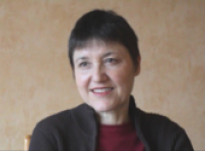Interview 28

Age at interview: 52
Brief Outline:
Had first routine mammogram at age 52. Was diagnosed with DCIS. Questioned need for surgery. Researched alternatives and sought counselling. Decided to accept mastectomy and reconstruction 6 months after diagnosis.
Background:
A teacher, married with 2 adult children.
More about me...
See more clips about this interviewees experiences of Ductal Carcinoma in-situ (DCIS).
Did not feel anxious when she was recalled as she didn't think there would be anything wrong.
Did not feel anxious when she was recalled as she didn't think there would be anything wrong.
SHOW TEXT VERSION
PRINT TRANSCRIPT
I thought well this is just a mistake, there is, there has been some glitch with the process. Again it wasn't going to be breast cancer. In fact I was joking with them because I have very small breasts and I just kept saying "Well they couldn't find anything on the mammogram, that's what it was, there wasn't a breast there, I'm too small."
Had not heard of DCIS before her own diagnosis.
Had not heard of DCIS before her own diagnosis.
SHOW TEXT VERSION
PRINT TRANSCRIPT
The day that we received the results I was told that I had DCIS and they explained very briefly what it was.
Says she would not have surgery immediately if she had DCIS again.
Says she would not have surgery immediately if she had DCIS again.
SHOW TEXT VERSION
PRINT TRANSCRIPT
So it would be my intention, unless there was very strong, there had been further research and evidence to the contrary, but if they find DCIS this time I will be able to say "Well I'll wait and we'll see or we'll perhaps go for a second mammogram in a couple of years and we'll see if things have changed much, because its likely to be very slow moving and I could afford to wait." And I suppose I've just proved to myself that I could live with the uncertainty of that too because if I became too troubled by it, it would have to, I would have to reconsider. I think that would be my hope.
But I think now I would make that choice for the other breast but I wouldn't necessarily go down the path of instant surgery, in fact I'm sure I'd wait and see whether a new treatment by then had been developed or whether my risk was very small.
She felt fit, healthy and not at any risk of breast cancer and went for screening out of curiosity.
She felt fit, healthy and not at any risk of breast cancer and went for screening out of curiosity.
SHOW TEXT VERSION
PRINT TRANSCRIPT
I didn't feel myself to have any of the risk factors that I knew about at that stage. I'm quite small so I knew that overweight people were slightly more at risk, there's no family history. I had breast-fed my children and all these things I thought put me out of the risk category. And because I didn't feel myself to have risk factors I thought I was safe from breast cancer and I realise now that was an absurd assumption. But I somehow thought that if you weren't at risk you were safe. So I only went out of curiosity, I didn't really go because I had considered I would be affected. And as a result I don't think I read the screening literature particularly carefully. I just went along.


